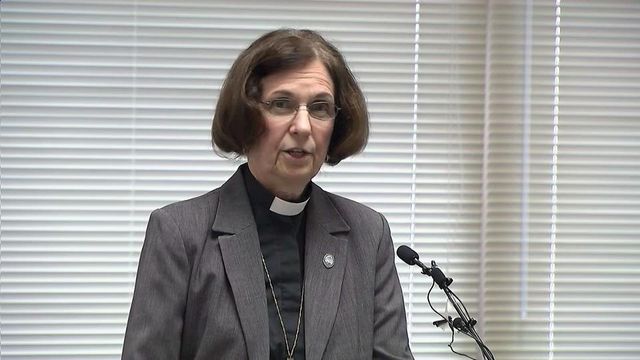Public weighs in on magistrates bill
A key House committee heard public comment Wednesday on a bill allowing magistrates and county workers with religious objections to gay marriage to opt out of marriage duties entirely.
Posted — UpdatedSenate Bill 2 passed the Senate last week. The meeting Wednesday was its first airing in the House.
Committee Chairman Rep. Leo Daughtry, R-Johnston, said he had heard from nine members of the public who wished to be heard by lawmakers. Of those, six were against the legislation, two were in favor of it and one declined to take a position but expressed concerns about its unintended consequences on county offices.
Among the opponents who spoke were Equality NC director Chris Sgro and ACLU legislative director Sarah Preston, both of whom recapped arguments they made during a Senate committee hearing.
"It should not be the policy of the General Assembly to allow government employees to pick and choose which job duties they wish to perform," said Preston. "What's the next category of government official that will refuse to do part of their job? And what job responsibility will it be?"
The panel also heard from two familiar voices in support of the measure: North Carolina Family Policy Council Director John Rustin and North Carolina Christian Action League Director Mark Creech, both of whom praised the proposal as a way to protect the religious freedom of magistrates and employees of county register of deeds offices.
Rustin said the bill is a carefully crafted balance that will not deprive anyone of their right to marry. Counties would be required to have someone available to provide civil marriages to all who qualify for 10 hours a week, even if all their magistrates opt out. Registers of deeds offices would still have to issue marriage licenses even if all their employees opt out of that duty as well.
"To suggest that marriages will stop in North Carolina is just not factual," Rustin said.
The panel also heard from two members of the clergy who opposed the bill. Episcopalian Rev. Lorraine Lundgren of Raleigh and Baptist Rev. Terence Leathers of Clayton both cautioned lawmakers not to confuse a civil ceremony with a religious one.
Leathers said churches have the constitutional right to decide whom they will serve, but civil servants do not.
"When public officials seek to deny services to members of the tax-paying public based on their religious beliefs, they're not living up to their oath, and they're not serving the common good," Leathers said. "We believe in America that the government should treat everyone equally under the law and not discriminate."
Also speaking at the meeting was Raleigh businessman Tony Cope, owner of Myriad Media. He said ideological bills like Senate Bill 2 are discouraging talented workers from moving to the state and have made it more difficult for him to strike business deals with tech companies, some of which have gay and lesbian executives.
"I want to grow my business in North Carolina," Cope told the panel. "This type of legislation works against us every day."
Two registers of deeds also spoke at the meeting.
Guilford County Register of Deeds Jeff Thigpen said his office issued 3,600 marriage licenses last year, 265 of those to same-sex couples. He said allowing employees to choose not to issue marriages licenses "puts me at a significant disadvantage in terms of staffing."
"If a Catholic employee discovers that an applicant is applying for a second marriage, can they object?" Thigpen asked. "The bill doesn't give local elected officials any flexibility."
Caldwell County Register of Deeds Wayne Rash is legislative director of the North Carolina Association of Registers of Deeds. He said the group has not taken a position on the bill, but he noted 42 of the state's 100 county offices have three or fewer employees. Half of those have only two workers.
"We do have some very serious concerns about the implementation and how that would work," Rash said.
Daughtry didn't indicate when the panel might vote on the bill. Its next regularly scheduled meeting is March 11.
Related Topics
• Credits
Copyright 2024 by Capitol Broadcasting Company. All rights reserved. This material may not be published, broadcast, rewritten or redistributed.






